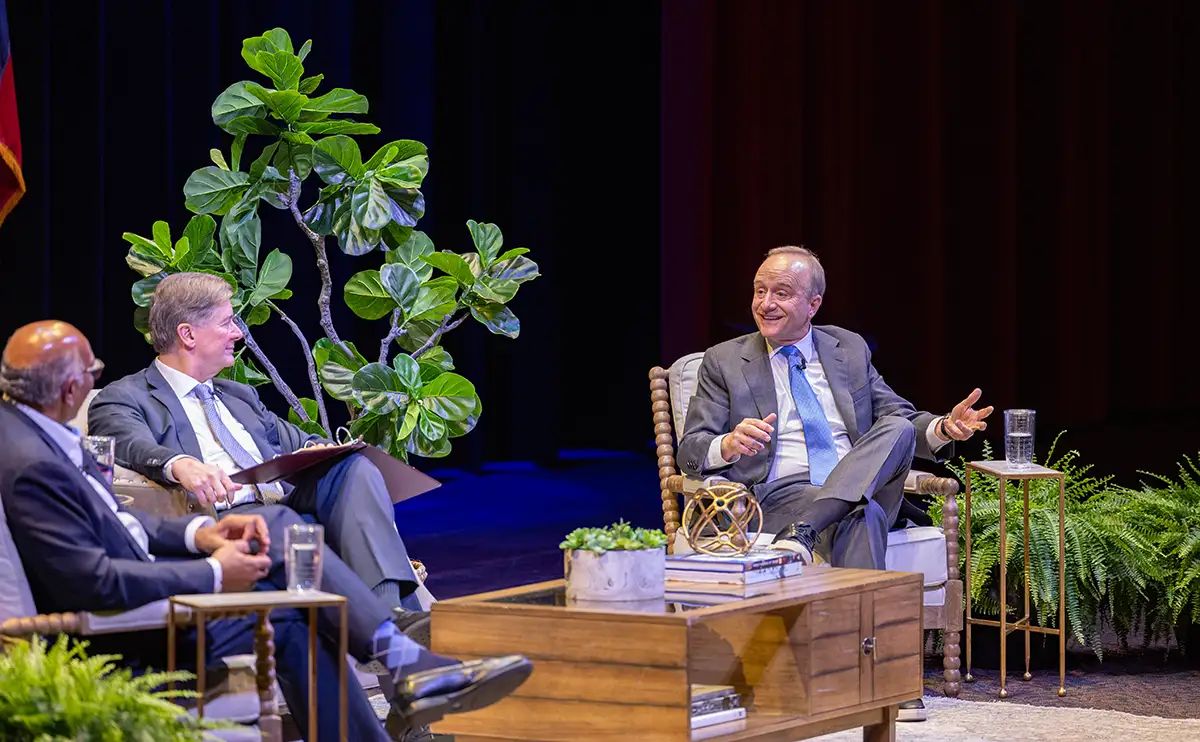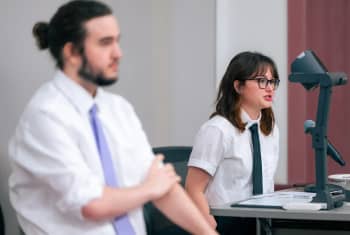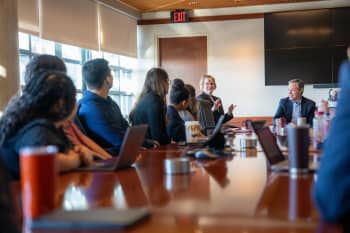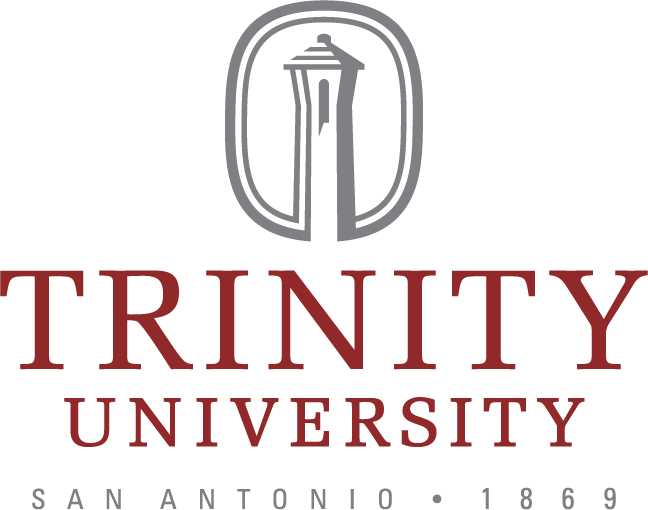Cultivating Civic Dialogue Through Liberal Arts Education
Trinity University empowers students to listen deeply, think critically, and learn across divides through its signature dialogue initiative
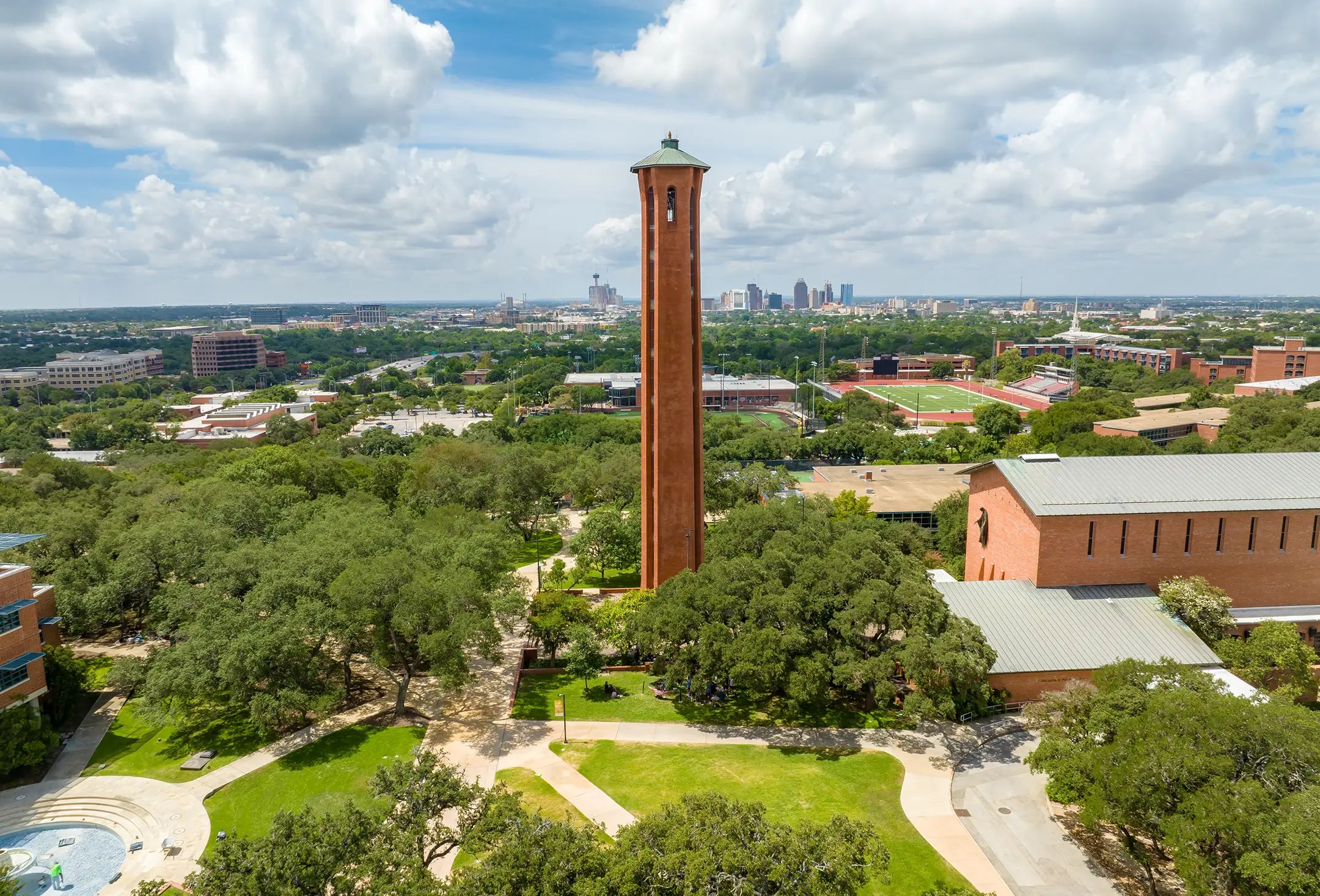
When I remember my experience as a Trinity student, it was all about the conversations. Conversations in class about revolutionary ideas and historical events. Conversations with my roommate at 3 a.m. that ranged across disciplines, political perspectives, and religious traditions. These memories made me excited to return to Trinity as a professor and lead conversations with students.
Students who ask interesting questions, listen, and think freely can become thoughtful citizens. But many who yearn for meaningful discussions hesitate to disagree or say something that might be challenged. They often fear social death or polarized conflict.
In the 2024-25 academic year, Trinity University in San Antonio, Texas, launched The Conversation at Trinity. This series promotes constructive dialogue and programs that distinguish Trinity’s liberal arts education as a laboratory for democracy. The inaugural year included 30 events. Students participated in facilitated conversations, town halls, public debates, workshops on conflict mediation, film screenings followed by small group discussions, and tabletop exercises for student leaders. They attended public dialogues between prominent guests, held intimate discussions with peers, and participated in role-playing exercises for resident assistants and student leaders.
Paul Begala (right), former advisor to President Clinton, spoke with Michael Steele (left), former chair of the Republican National Committee, as part of a conversation moderated by Trinity history professor David Lesch, Ph.D., (center) for the University’s Distinguished Lecture Series.
Paul Begala (right), former advisor to President Clinton, spoke with Michael Steele (left), former chair of the Republican National Committee, as part of a conversation moderated by Trinity history professor David Lesch, Ph.D., (center) for the University’s Distinguished Lecture Series.
The event series featured public conversations across the aisle, including Trinity’s Distinguished Lecture Series with Paul Begala, former advisor to President Clinton, and Michael Steele, former chair of the Republican National Committee. We hosted former Congressmen Mike Capuano (D-MA) and Joe Heck (R-NV) as part of Congress to Campus. We held listening circles to reflect on election results and hosted a youth-led mayoral forum to discuss local issues. And our debate team led four public debates on climate change, immigration, reproductive rights, and artificial intelligence.
Our conversations were not only across political differences but also across disciplines. The Tinker Memorial Lecture featured two former Trinity roommates who explored connections between religion and medicine: Simran Singh, Ph.D., class of 2006, and Dave Levy, M.D., class of 2005. Additionally, a dozen students enrolled in an interdisciplinary listening course co-taught by President Vanessa Beasley, Provost Megan Mustain, and me. Including experts from Trinity faculty, staff, and invited guests, the course ranged from the neurophysiology of listening to rhetoric, philosophy, and performance. We modeled respectful dialogue and trained students to listen actively.
One of the most transformative parts of the inaugural year was Nurturing Hope San Antonio, a collaboration between Trinity, the University of Texas at San Antonio, and Northwest Vista College and in partnership with the Rotary Club of San Antonio and the H.E. Butt Foundation. Students developed skills in dialogue and reconciliation through a curriculum rooted in the Corrymeela Community of Northern Ireland. Former Corrymeela leader, poet, and theologian Pádraig Ó Tuama joined poets Naomi Shihab Nye, class of 1974, and Trinity professor Jenny Browne, MFA, for an evening of poetry and conversation on conflict resolution and hope in uncertain times. Students at each university also hosted campus events, and several will travel to Corrymeela this summer for an intensive learning experience.
Informing this programming, Trinity contributed to an online resource library as part of a working group for the American Colleges of the South. This living collection of classroom guides and co-curricular tools offers practical strategies for building dialogue in and beyond the classroom. It’s what helps The Conversation represent a core commitment of the liberal arts: to put disciplines, people, and ideas in dialogue with one another. Research and teaching, the campus and the city, the humanities and sciences—at Trinity, these intersect and converse.
Conversation is not a single skill. It is a constellation of habits—curiosity and genuine listening, courage and humility—that grow through mentorship and practice. Students develop these habits through their participation in expert-led discussions, interactive workshops, and guided reflection.
Going forward, Trinity will join a Council of Independent Colleges cohort using the Constructive Dialogue Institute’s Perspectives program, which offers students research-based tools for understanding each other. And we’re widening the aperture to include a broader range of topics, voices, and formats, reaching beyond election-season political disagreements.
Through The Conversation, Trinity students develop their capacity to take responsibility for their freedom. They test ideas, listen closely, and engage meaningfully with ongoing discussions that began before they arrived and will continue after they graduate. Most importantly, they learn to join the conversation.
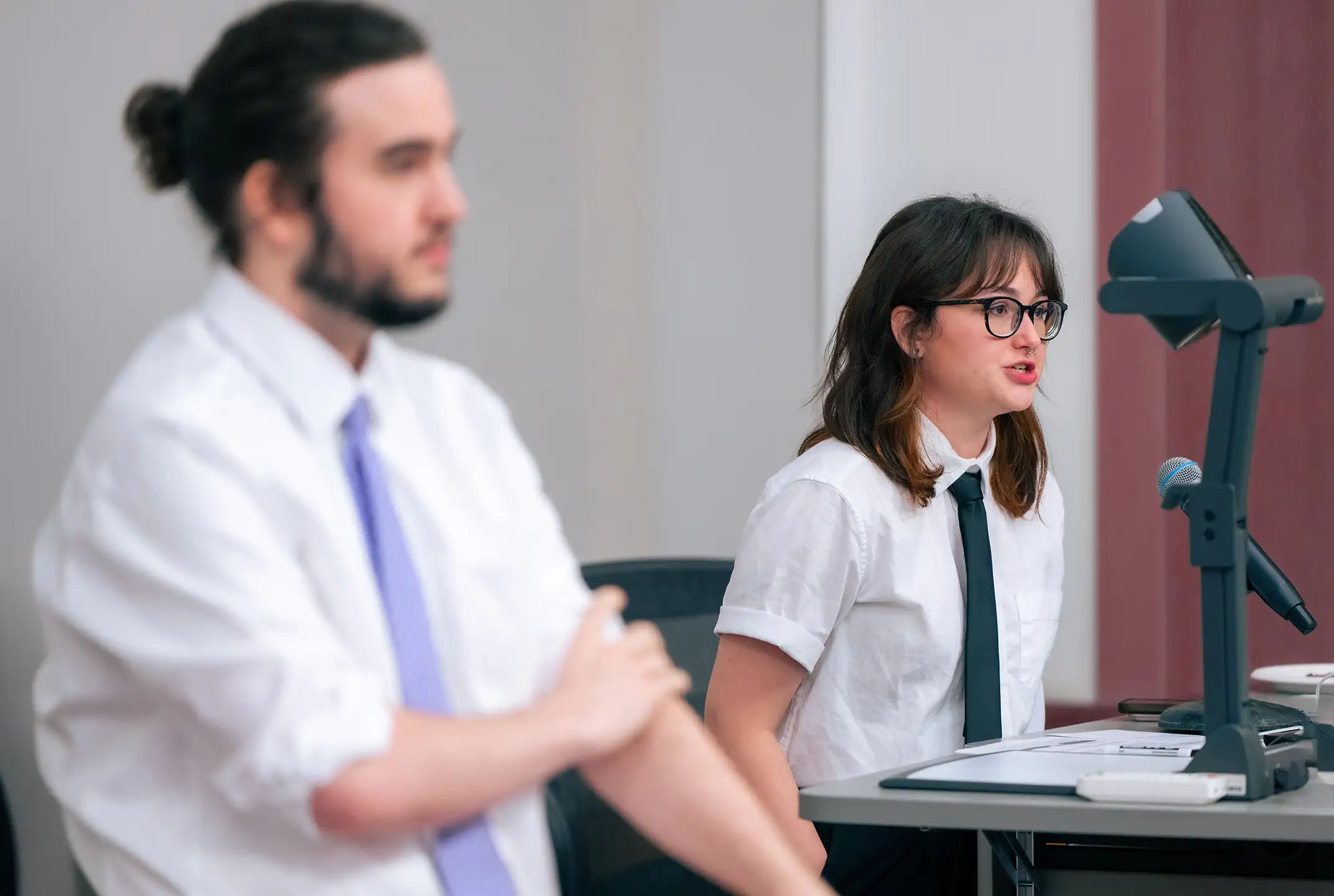
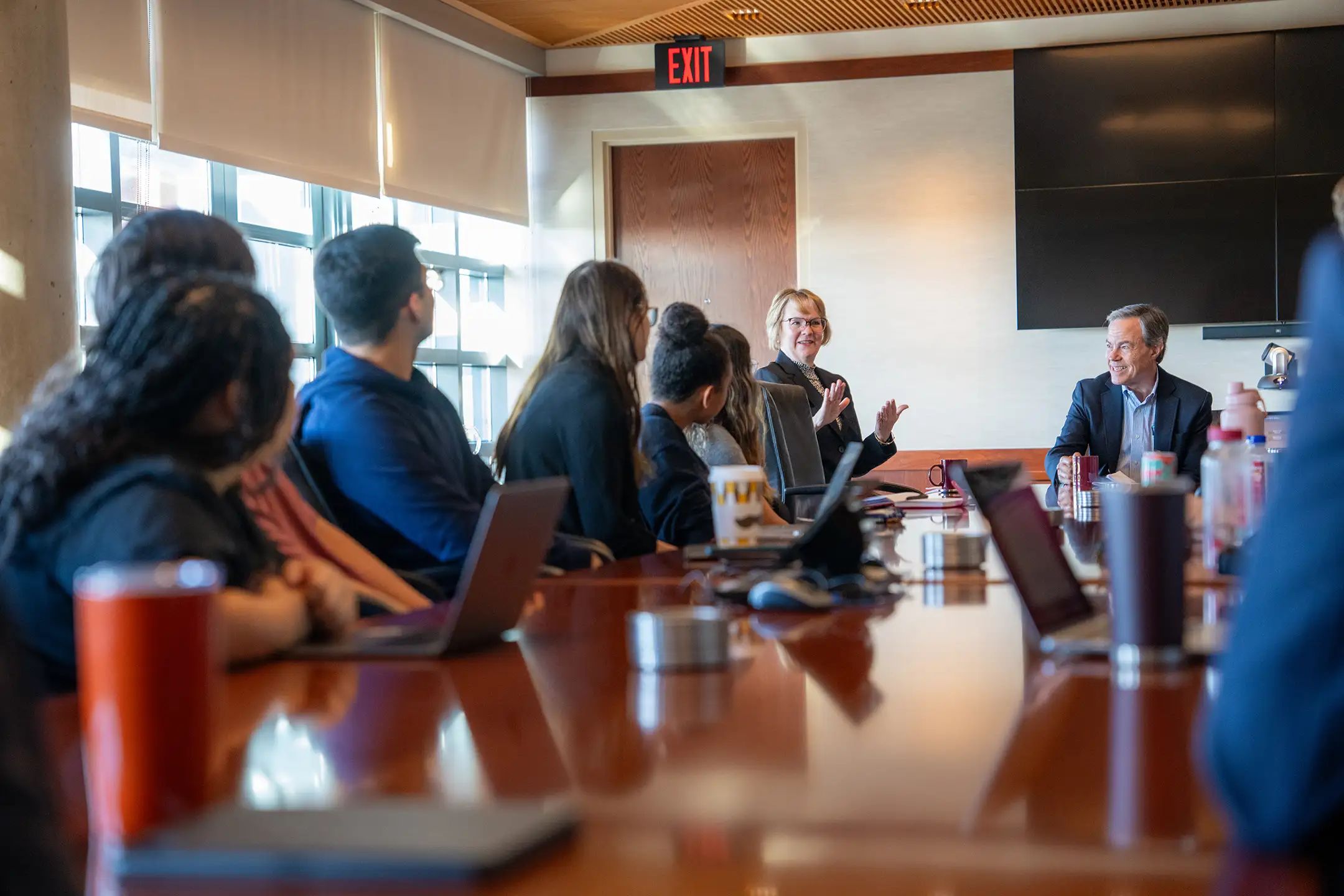
Kyle Gillette, Ph.D., Trinity University’s Associate Provost for Student Success, is a 2001 Trinity graduate and a professor of theater.
This sponsored content is provided by Trinity University and developed by Inside Higher Ed's sponsored content team. The editorial staff of Inside Higher Ed had no role in its creation.
When I remember my experience as a Trinity student, it was all about the conversations. Conversations in class about revolutionary ideas and historical events. Conversations with my roommate at 3 a.m. that ranged across disciplines, political perspectives, and religious traditions. These memories made me excited to return to Trinity as a professor and lead conversations with students.
Students who ask interesting questions, listen, and think freely can become thoughtful citizens. But many who yearn for meaningful discussions hesitate to disagree or say something that might be challenged. They often fear social death or polarized conflict.
In the 2024-25 academic year, Trinity University in San Antonio, Texas, launched The Conversation at Trinity. This series promotes constructive dialogue and programs that distinguish Trinity’s liberal arts education as a laboratory for democracy. The inaugural year included 30 events. Students participated in facilitated conversations, town halls, public debates, workshops on conflict mediation, film screenings followed by small group discussions, and tabletop exercises for student leaders. They attended public dialogues between prominent guests, held intimate discussions with peers, and participated in role-playing exercises for resident assistants and student leaders.
Paul Begala (right), former advisor to President Clinton, spoke with Michael Steele (left), former chair of the Republican National Committee, as part of a conversation moderated by Trinity history professor David Lesch, Ph.D., (center) for the University’s Distinguished Lecture Series.
Paul Begala (right), former advisor to President Clinton, spoke with Michael Steele (left), former chair of the Republican National Committee, as part of a conversation moderated by Trinity history professor David Lesch, Ph.D., (center) for the University’s Distinguished Lecture Series.
The event series featured public conversations across the aisle, including Trinity’s Distinguished Lecture Series with Paul Begala, former advisor to President Clinton, and Michael Steele, former chair of the Republican National Committee. We hosted former Congressmen Mike Capuano (D-MA) and Joe Heck (R-NV) as part of Congress to Campus. We held listening circles to reflect on election results and hosted a youth-led mayoral forum to discuss local issues. And our debate team led four public debates on climate change, immigration, reproductive rights, and artificial intelligence.
Our conversations were not only across political differences but also across disciplines. The Tinker Memorial Lecture featured two former Trinity roommates who explored connections between religion and medicine: Simran Singh, Ph.D., class of 2006, and Dave Levy, M.D., class of 2005. Additionally, a dozen students enrolled in an interdisciplinary listening course co-taught by President Vanessa Beasley, Provost Megan Mustain, and me. Including experts from Trinity faculty, staff, and invited guests, the course ranged from the neurophysiology of listening to rhetoric, philosophy, and performance. We modeled respectful dialogue and trained students to listen actively.
The Trinity University Debate Team engaged the campus community in a series of public debates on climate change, immigration, reproductive rights, and artificial intelligence.
The Trinity University Debate Team engaged the campus community in a series of public debates on climate change, immigration, reproductive rights, and artificial intelligence.
One of the most transformative parts of the inaugural year was Nurturing Hope San Antonio, a collaboration between Trinity, the University of Texas at San Antonio, and Northwest Vista College and in partnership with the Rotary Club of San Antonio and the H.E. Butt Foundation. Students developed skills in dialogue and reconciliation through a curriculum rooted in the Corrymeela Community of Northern Ireland. Former Corrymeela leader, poet, and theologian Pádraig Ó Tuama joined poets Naomi Shihab Nye, class of 1974, and Trinity professor Jenny Browne, MFA, for an evening of poetry and conversation on conflict resolution and hope in uncertain times. Students at each university also hosted campus events, and several will travel to Corrymeela this summer for an intensive learning experience.
Informing this programming, Trinity contributed to an online resource library as part of a working group for the American Colleges of the South. This living collection of classroom guides and co-curricular tools offers practical strategies for building dialogue in and beyond the classroom. It’s what helps The Conversation represent a core commitment of the liberal arts: to put disciplines, people, and ideas in dialogue with one another. Research and teaching, the campus and the city, the humanities and sciences—at Trinity, these intersect and converse.
Trinity President Vanessa B. Beasley engaged in conversation with Joe Straus, former Republican state congressman and speaker of the Texas House of Representatives, during a fall 2024 interdisciplinary course on listening.
Trinity President Vanessa B. Beasley engaged in conversation with Joe Straus, former Republican state congressman and speaker of the Texas House of Representatives, during a fall 2024 interdisciplinary course on listening.
Conversation is not a single skill. It is a constellation of habits—curiosity and genuine listening, courage and humility—that grow through mentorship and practice. Students develop these habits through their participation in expert-led discussions, interactive workshops, and guided reflection.
Going forward, Trinity will join a Council of Independent Colleges cohort using the Constructive Dialogue Institute’s Perspectives program, which offers students research-based tools for understanding each other. And we’re widening the aperture to include a broader range of topics, voices, and formats, reaching beyond election-season political disagreements.
Through The Conversation, Trinity students develop their capacity to take responsibility for their freedom. They test ideas, listen closely, and engage meaningfully with ongoing discussions that began before they arrived and will continue after they graduate. Most importantly, they learn to join the conversation.
Kyle Gillette, Ph.D., Trinity University’s Associate Provost for Student Success, is a 2001 Trinity graduate and a professor of theater.
This sponsored content is provided by Trinity University and developed by Inside Higher Ed's sponsored content team. The editorial staff of Inside Higher Ed had no role in its creation.


